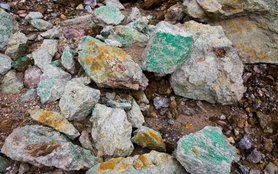The new Consolidated Mining Standard Initiative would merge standards within the mining industry, but its current draft does not meet best practice and gives industry too much control.
As the world makes the leap to clean energy, demand for transition minerals like lithium, cobalt, and copper is at an all-time high. These projections are debatable and even dangerous—mining remains one of the costliest sectors for human rights and life. Any expansion to the sector must avoid the mistakes of the past and follow a race to the top on standards and best practices to ensure that mining is done in a transparent way that respects the rights, health, environment, and livelihoods of the people living in front line mining communities.
A new global mining standard proposes to do precisely this – but is it too proximate to industry?
Four industry associations—the International Council on Mining and Metals (ICMM), the Copper Mark, the Mining Association of Canada (MAC), and the World Gold Council (WGC)—have recently decided to combine their individual commitments and self-regulatory policies into a Consolidated Standard. These organizations represent 100 mining companies across approximately 600 facilities in around 60 countries. With such a significant share of the mining industry covered by this standard, it has the potential to raise the performance of mining sites around the world; but only if it’s done well.
Unfortunately, in its current draft form, the Consolidated Mining Standard falls woefully short of this aim. If broadly adopted, it instead has the potential to significantly set back the industry, erasing years of hard-fought progress on issues such as the Free Prior and Informed Consent (FPIC) of Indigenous Peoples, transparency, human rights, and countering corruption. The draft also lacks sufficient detail to ensure auditability, and its ambiguous language creates unclear expectations for companies and insufficient accountability for stakeholders.
Importantly, the Consolidated Mining Standard Initiative (CMSI), is seeking to solve for a problem that doesn’t exist—there are already robust voluntary standards for the mining industry that they could encourage their member companies to join. The Initiative for Responsible Mining Assurance (IRMA) offers a strong facility-level standard and certification process and the Extractive Industries Transparency Initiative (EITI) has its own Standard and Company Expectations governing necessary sector-specific public disclosures, for example. CMSI funding is from the mining industry itself and the initiative does not currently have the civil society or government buy-in to become a properly balanced, multi-sectoral representative body. There is no need for a new standard that lowers the bar.
Fortunately, there’s still time to get it right. The CMSI just closed its first consultation period. It will incorporate comments, and is expected to release a second draft of the Standard for another round of public consultation in mid-2025.
Oxfam submitted comments on the draft, focusing on several areas core to our mission where we think the Standard needs significant improvements. The full text of our comments on the standard, governance model, and assurance process are available here. We also contributed to a civil society briefing for automakers – a key stakeholder given the growing demand for transition minerals for electric vehicle batteries – which is available here.
By attempting to retain industry control, the CMSI falls short of multi-stakeholder governance.
The Board Chair will be chosen by the ICMM, WGC, MAC, and Copper Mark, in consultation with the Stakeholder Advisory Group (SAG) and Industry Advisory Group (IAG), and then the Chair will work with the SAG and IAG to select the rest of the board. While it’s useful to see that the SAG includes some civil society and community representatives, it’s also important to note that the four partners assembled the SAG, thus it should not be conflated with truly independent civil society representation.
Though seats on the CMSI board are reserved for “mining stakeholders,” and “value chain stakeholders” there is no reason to believe that these board members will truly represent the interests of project-affected communities and civil society. Representation in each group is vaguely stated—for example, “other interests” for committee representation “could include investors, providers of finance, multilateral organizations, responsible mining or value chain initiatives, academics, think-tanks, international NGOs, etc.” We worry that those chosen for these roles will be industry allies who have moved onto roles at think tanks, academia, etc., and that genuine rights-holder or civil society representation will be sacrificed.
The CMSI must conform to international law and norms that protect the human rights of Indigenous Peoples, including requiring companies to respect the right to FPIC.
The draft standard fails to protect Indigenous Peoples’ rights in line with international law, especially their right to self-determination and to FPIC, as affirmed in the United Nations Declaration on the Rights of Indigenous Peoples (UNDRIP). The CMSI must require FPIC policy commitments for all participating companies, and must make explicit that if agreement is not obtained then the project should not move forward. FPIC as referenced in the CMSI falls far short when compared to other multi-stakeholder initiative standards like the Initiative for Responsible Mining Assurance and Roundtable on Sustainable Palm Oil. The standard must provide much more detail on expectations for companies, including stronger gender language and an explicit requirement that companies will avoid mining activities in areas with a presence of Indigenous Peoples in voluntary isolation and initial contact.
On transparency and tax, the CMSI needs to keep up with global best practices and uphold commitments its members have already made.
As written, the CMSI falls below both global best practices set by the Extractive Industries Transparency Initiative Standard, the IMF’s Fiscal Transparency Code, the Global Reporting Initiative’s Sector Standard for Mining, the OECD’s Guiding Principles, and the B Team’s Responsible Tax Principles on several issues—payments to governments disclosures, contract transparency, public country by country tax reporting, responsible tax, and beneficial ownership disclosure. More worryingly, in the draft Standard, the CMSI walks back several ICMM transparency commitments, particularly those on payments to governments, contract disclosure, and public country by country reporting, as well as the World Gold Council’s Responsible Mining Principles.
Companies must make clear public commitments respecting the human rights of defenders.
With mining considered the most dangerous sector for defenders, mining companies must develop and act on strong policies for the protection of human rights defenders. There is a growing body of standards and guidance on corporate policies that commit to not tolerate or contribute to attacks against defenders, yet the CMSI fails to include specific requirements for companies on the protection of human rights defenders. CMSI should require companies to:
- Commit to protecting the rights and legitimacy of human rights defenders by adopting and disclosing a policy and ensuring that business relationships (suppliers, contractors, etc.) commit to zero tolerance of retaliation against defenders.
- Engage with communities and local civil society in inclusive and culturally and gender-responsive ways to identify and address risks for defenders and facilitate access to information relevant to the protection of defenders.
- Work with defenders to create safe and enabling environments for civic engagement and human rights at local, national, or international levels.
- Refrain from supporting strategic lawsuits against public participation (SLAPPs) that diminish established legal protections for defenders.
The CMSI should meaningfully address the gender-differentiated impacts of mining.
The CMSI makes minimal mentions of gender and largely fails to engage with the gender-differentiated ways that mining effects communities. The CMSI must, at a minimum, honor the previous commitments on gender made in the ICMM’s Social and Economic Reporting Framework and Guidance and MAC’s Equitable, Diverse, and Inclusive Workplaces Protocol, which are currently missing from the draft standard. We further urge the CMSI to engage affected stakeholders and rights-holders in the baseline collection of data for risk and impact assessments as a foundational practice.
The CMSI must strengthen its requirements for stakeholder engagement.
In order to be effective and meaningful, stakeholder engagement should always be established in collaboration with rightsholders, with particular attention to diverse and gender-balanced representation from the community, and should be early and ongoing throughout the project lifecycle. The CMSI should provide more detailed requirements for effective community consultation, and should make explicit that consultation processes with communities facing potential adverse impacts from projects must adhere to the principles of FPIC, including enabling Indigenous Peoples and customary land holders to give or withhold their consent for project activities that affect their lands and natural resources.



